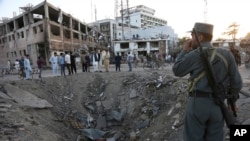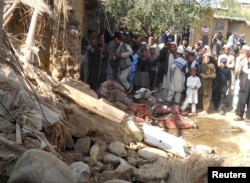A suspected drone strike has reportedly killed a key Haqqani network commander in a remote Pakistani tribal district, according to Pakistani security officials.
The attack late Monday targeted a leader of the terror group, identified as Abubakar. Local officials suspected the strike was from a U.S. drone, but the Pentagon denied carrying out the attack.
"The Department of Defense has not conducted any recent strikes in Pakistan," Pentagon spokesman Adam Stump told VOA Pentagon correspondent Carla Babb on Wednesday.
Behram Khan, a resident of Dewal village in the Speen Tal area of the Hangu district, told Radio Liberty that three others were wounded in the strike, including a boy.
Abubakar, whose original name was Omar, hailed from Afghanistan's southeastern Khost province, the birthplace of network founder Jalaluddin Haqqani, according to Afghan and Pakistani intelligence reports.
Khan said the slain commander moved to Dewal from Pakistan's North Waziristan tribal district after the Pakistani military launched a counterterrorist operation there in 2014.
The suspected drone strike came after a May 31 truck bombing in Kabul killed more than 150 people in the deadliest attack in the Afghan capital since the ouster of the Taliban following the U.S.-led invasion in 2001.
Afghan officials blamed the Pakistan-based Haqqani network for the blast. But network leader Sirajuddin Haqqani, in a rare Pashto language audio message released over the weekend by the Taliban to VOA, denied insurgents' involvement in the attack.
Based in tribal region
The Haqqani network, a militant group that fights Afghan and U.S. forces in Afghanistan and is a U.S.-designated foreign terrorist organization, is reported to be based in Miram Shah, a town in the Federally Administered Tribal Areas in northern Pakistan.
The network operates base camps where it trains suicide bombers and does logistical planning for military operations, according to media reports.
In recent years, group members have moved to other areas in the tribal region that borders Afghanistan, from where they launch attacks against Afghan and U.S. forces stationed in the country, according to U.S. officials.
Afghan officials and U.S. terrorism authorities consider the network one the most lethal terrorist groups in Afghanistan. It has been blamed for some of the deadliest violence in the country, including attacks on embassies in Kabul, the Afghan parliament building, local residents and U.S. military bases.
Monday's drone attack was not the first one in the area. A senior Haqqani commander was killed in 2013, along with several other members of the group, by a U.S. drone strike.
U.S. drone attacks in Pakistan have resumed as Afghanistan has seen an uptick in terrorist activities and violence that Afghan and U.S. officials blame largely on Pakistan.
U.S. action urged
"The Haqqani network, which is an ally of al-Qaida and Taliban extremists, has operated as Pakistan's proxy," Zalmay Khalilzad, former U.S. ambassador to Afghanistan and Iraq, told VOA recently.
"If Pakistan refuses to move against the Haqqani network sanctuaries, the U.S. should consider actions against the sanctuaries, including striking them," he said.
Afghan intelligence officials told VOA's Afghan service that the Taliban purposely deny involvement in most deadly attacks in Afghanistan to secure their Pakistani sponsors from further isolation.
Islamabad has rejected the charges as baseless and unfounded, saying Pakistan "in the strongest terms" has condemned the Kabul terrorist attack. Pakistan officially has dismissed allegations that Taliban insurgents are using Pakistani soil for orchestrating the violence.
VOA's Deewa service contributed to this report from Peshawar. VOA's Carla Babb reported from the Pentagon





